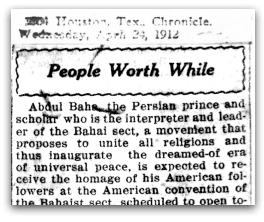
April 24. On this date in 1912,
an article in the
Houston Chronicle noted that "Bahá’ísm now has 15,000,000 adherents scattered throughout the world, several hundred thousand of whom are in the United States and Canada."
'Abdu’l-Bahá the Persian prince and scholar who is the interpreter and leader of the Bahá’í sect, a movement that proposes to unite all religions and thus inaugurate the dreamed-of era of universal peace, is expected to receive the homage of his American followers at the American convention of the Bahá’í sect, scheduled to open today in Chicago. ‘Abdu’l-Bahá, which is a title signifying Servant of God, comes to America to carry on the propaganda of the new faith and to address the peace conference at Lake Mohonk, N.Y., next month. Although it was founded only 68 years ago, Bahá’ísm now has 15,000,000 adherents scattered throughout the world, several hundred thousand of whom are in the United States and Canada.
‘Abdu’l-Bahá succeeded to the leadership of the sect 20 years ago, on the death of Bahá’u’lláh, his father, who was the “illuminated one” of Bahá’ísm and was known as the Glory of God. Brotherhood and peace between men and nations are the central dogmas of the teaching of ‘Abdu’l-Bahá. Already they have had effect in the constitutional movements in Persia and Turkey, where Bahá’ísm is rapidly gaining ground. Because of their propaganda, which was considered by the fanatical Moslems to constitute an attack on their religion, ‘Abdu’l-Bahá and his father were imprisoned for nearly half a century.
When Mohammed Ali began preaching the doctrines of Bahá’ísm in 1844, he soon found a devoted adherent in the wealthy Prince of Nur, one of the most influential of Persians and a descendant of the ancient royal family of that country. When the prince was recognized as Bahá’u’lláh, the expected one, the Glory of God, he was thrown into prison and all his property was confiscated. From the wealthiest man of Persia, he became its most miserable, but his faith in the new dispensation never wavered, and it was fully shared by his son, the present ‘Abdu’l-Bahá. ‘Abdu’l-Bahá was only 9 years old when he was deprived of the luxuries and pleasures of the palace and thrown into a dungeon at Acca, perhaps the most loathsome prison in the world. He was about 60 when he was released. Although deprived of all formal education, ‘Abdu’l-Bahá was taught by his father and this fitted him to become a worthy successor.
‘Abdu’l-Bahá, with his wonderfully penetrating eyes, his wealth of silvery hair and long white beard, and his thoughtful and philosophic air, would be a striking figure if clad in conventional garb.
 April 24. On this date in 1912, an article in the Houston Chronicle noted that "Bahá’ísm now has 15,000,000 adherents scattered throughout the world, several hundred thousand of whom are in the United States and Canada."
April 24. On this date in 1912, an article in the Houston Chronicle noted that "Bahá’ísm now has 15,000,000 adherents scattered throughout the world, several hundred thousand of whom are in the United States and Canada."
No comments:
Post a Comment